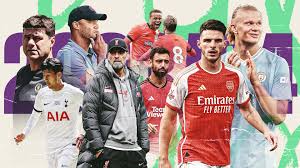In a recent turn of events, Premier League clubs have voted against the implementation of a temporary ban on loan deals between associated clubs, setting the stage for an intriguing January transfer window. The decision, with 13 clubs in favor of the ban and 7 against it, brings to light the complex dynamics surrounding affiliations in English football, with potential implications for clubs eyeing strategic moves in the upcoming transfer market.
Table of Contents
IMAGE CREDITS: ESPN
Newcastle’s Strategic Advantage
The rejection of the temporary ban holds significant ramifications for Newcastle United, a club under the ownership of The Public Investment Fund of Saudi Arabia (PIF). With an 80% stake held by PIF, Newcastle can now explore loan deals with its affiliated Saudi Pro League clubs — Al Nassr, Al Ahli, Al Ittihad, and Al Hilal. This decision provides Newcastle, currently grappling with an extensive injury list, a strategic advantage in reinforcing their squad for the challenges ahead.
The Target: Ruben Neves
IMAGE CREDITS: ESPN
Among the potential transfers in the spotlight is Ruben Neves, Al Hilal’s midfielder and a former key player for Wolves. Newcastle’s manager, Eddie Howe, has openly admitted the club’s interest in securing Neves, adding depth to the midfield. The allure of acquiring a player of Neves’ caliber, who could potentially be acquired without a transfer fee in January, further underscores the significance of Newcastle’s affiliations in navigating the transfer market.
Injury Woes and Player Bans
IMAGE CREDITS: ESPN
Newcastle’s injury concerns, including key players like Sven Botman, Callum Wilson, and others, amplify the urgency for strategic acquisitions. Additionally, the suspension of midfielder Sandro Tonali for 10 months due to breaches of betting rules in Italy further accentuates the club’s need for reinforcements, making affiliations a crucial component in addressing immediate squad requirements.
Network of Affiliations Across Premier League Clubs
IMAGE CREDITS: ESPN
Examining the affiliations between Premier League clubs and teams worldwide unveils a complex network. Noteworthy affiliations include Manchester United’s potential deal with OGC Nice and Manchester City’s ability to loan players from the expansive City Football Group. The interconnected nature of these affiliations has historical precedence, with past transfers like Frank Lampard’s move from New York City to Manchester City.
Analysis of the Vote and League Landscape

IMAGE CREDITS: ESPN
The close vote, falling short by one, reflects the divided opinions among Premier League clubs. While concerns persist regarding potential advantages for clubs like Newcastle, it is essential to recognize that affiliations and multi-club structures are becoming increasingly prevalent across almost half of the league. The rejection of the temporary ban emphasizes the need for ongoing discussions around potential policies to address the evolving dynamics within the league.
Broader League Developments
Beyond the specific vote on loan deals, the absence of a formal vote on the ‘New Deal’ — a significant £915 million settlement between the Premier League and clubs in the English Football League (EFL) — leaves room for continued discussions. The league’s commitment to consulting with the EFL on funding mechanisms, cost controls, and transfer levies indicates a broader effort to strengthen the financial landscape of English football.
VAR and Refereeing Standards
The meeting also saw discussions led by PGMOL chief Howard Webb on VAR and refereeing standards in the Premier League. The establishment of a top-flight advisory group signifies a proactive approach to enhancing in-stadium communication regarding VAR, addressing concerns and improving the overall fan experience.
Everton’s Situation
Conspicuously absent from the agenda was the case surrounding Everton’s 10-point deduction and the potential appeal process. The omission raises questions about the ongoing complexities within the league, both on and off the field, and highlights the need for continued scrutiny and dialogue.
IMAGE CREDITS: ESPN
As the January transfer window looms, the decision to reject the temporary ban on loan deals between affiliated clubs adds a layer of intrigue to the Premier League landscape. The intricate web of affiliations continues to shape transfer strategies, with Newcastle positioned strategically to leverage their connections. While concerns persist, ongoing discussions and potential future policies will play a crucial role in shaping the dynamics of player transfers and club affiliations in English football.



